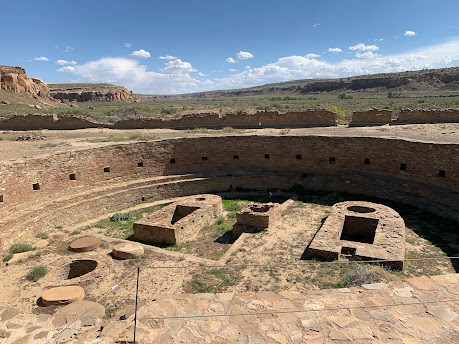New Mexico
From the 50 State Visitor Guide:
N.M. Stat. Ann. 2019 §§29-11A-1 through 29-11A-10
N.M.A.C. §1.18.790.157
Registration Triggers and Deadlines:
5 business days for initial registration & updates. §29-11A-4.
State law requires “sex offenders” to register, which includes one who: (1) establishes a residence [not defined] in NM; (2) “stays in multiple locations in NM,” or (3) is enrolled in a NM school, or (4) is employed in NM for more than 14 days or an aggregate period exceeding 30 days in a calendar year. §29-11A-3.
Visitors:
Residency/Presence and Other Restrictions:
State pre-emption: Cities, counties & other political subdivisions are prohibited from adopting any ordinance, rule, regulation, resolution or statute on sex offender registration and notification and from imposing any other restrictions on sex offenders that are not included in the state SOR Act. §29-11A-9.
Duration & updates:
10 years to life. Updates are every 6 mo. or every 90 days depending on offense. §29-11A-4.
Most recent visit: October 2023
If your conviction was prior to July 1, 2013 New Mexico will require you to register if in the state for longer than ten days. However, if (like me) your conviction was after July 1, 2013 you only get five days. Two pieces of good news: N.M. Stat. §29-11A-4 says that either way, it’s business days. Also, there appears to be no limit per month or year, so you can leave the state for one complete calendar day (including the two nights on either side of that day, and making sure to keep your receipts to prove your whereabouts) and restart the clock again when you return.
One other piece of very good news is that not only does New Mexico have no statewide presence or residency restrictions, it is also one of seven states that statutorily pre-empt local governments from adopting any ordinance or regulation more restrictive than state law. So you can travel in New Mexico without fear of unknowingly tripping over some local land mine.
In October 2023 I was on my way to the annual ACSOL Conference and took the opportunity to see some parts of this state I’d never visited before. I was in the state for parts of three days, entering on a Saturday and leaving on a Monday which so happened to be Indigenous Peoples Day (a.k.a. Columbus Day), so I was in New Mexico for zero business days and never actually started their five business day clock toward a registration requirement.
Entering about mid-morning of Day 1 from Colorado on I-25, I quickly ditched the interstate highway to explore New Mexico’s rugged north country on U.S. 64. Passed by Philmont Scout Ranch where I had lead a group of teens on a backpacking adventure a lifetime ago. Did not hear any hum in Taos. Took a few side trips to peak at Rio Grande Del Norte National Monument, Bandelier National Monument and Valle Grande National Preserve. All worthwhile places to visit – maybe I’ll stay longer next time.
Another interesting stop late on Day 1 was San Ildefonso Pueblo. As a rule, I have found that the people of the indigenous pueblos of the Southwest would much rather be left alone, but they know that tourists want to gawk at their pueblos, especially an authentic place like San Ildefonso. The people here have put a Visitor Center at the entrance to their pueblo (closed that afternoon on account of a traditional ceremony) and have established a short driving tour you’re allowed to take as long as you stay the heck out of the rest of their community. Very interesting!
Spent the night in Los Alamos (the town, not the military base).
Chaco Culture National Historic Park
On Day 2 my main adventure was Chaco Culture National Park. I entered from the north from U.S. 550. Peering down the dirt County Road 7900 I thought, this is an official county road leading to a national park – surely it’s well maintained, right? And it was – until it wasn’t!! After that you and your car’s suspension are on your own! This just illustrates how neither the Navajo Nation nor any other local government has no particular interest in whether you can get to Chaco Canyon or not.
But just when I was sure my car was a goner I passed the park entry monument and Tadahhh !! everything inside the park is nicely paved. Later on, leaving by the south (CR 14) was also dirt, longer but a much easier ride – although it had its moments. I was told that these road conditions can vary widely from year to year and season to season. Just be ready for anything.
However, the park itself is truly spectacular. The canyon is beautiful, and the ancient pueblos and kivas are among the best preserved you’ll see anywhere. Even I who have no military experience could see that the three main pueblos are strategically located so that, between them, the entire canyon could be well defended and the Anasazi could see any unwanted visitors approaching.
That night I camped that night at El Malpais (“The Badlands”) National Monument before taking a tour of its wonders the next morning, Day 3 of my tour of New Mexico. That morning I also stopped at Bandera Ice Caves & Volcano, a private attraction that’s really worth the stop, and El Morro (“The Headwaters”) National Monument which has petroglyphs, a pueblo & kiva, and the graffiti of early Spanish explorers.
Previous visit: October 2021
When I entered New Mexico from Texas in October 2021 I had a reservation for a tour at Carlsbad Caverns. Technically, you are required to have such an advance reservation, but on the shoulder season day I arrived it wasn’t booked up so I could’ve bought the $1.00 ticket at the counter.
Wow! Best. Cavern. Ever! Just go, and you’ll know exactly what I mean.









No comments:
Post a Comment